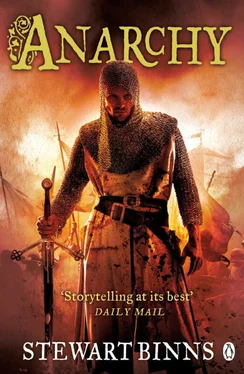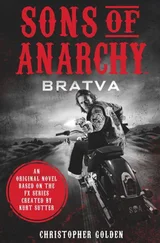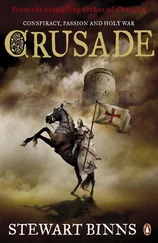Raphael of Pesaro was in a more generous mood when we arrived. He had gathered a small group of marines and men, who he introduced to us as his training officers. I could sense that these men had been told that the morning might be entertaining, with an adolescent English knight making a fool of himself in a futile attempt to join Venice’s renowned corps of marines. Our Norman interpreter looked uncomfortable, which only added to my apprehension.
‘So, Harold of Hereford, to the bow. First, six arrows each from your quivers. Your target is over there on the other side of the dock – the large mooring post in the middle.’
The post was about seventy yards away, so demanded a flatter trajectory than our usual aerial tactic. But, at about a foot wide, it was relatively easy to hit. The wind was light and our aim good: from our twenty-four arrows, we had thirteen hits and most of the rest were very close. There were nods of approval from the Master’s retinue.
The arrows were brought back to us and Raphael issued another challenge.
‘The four of you shooting together, four volleys. Your target is that patch of dry ground in the empty dock area beyond the furthest quay.’
The area was almost 200 yards away, a target distance much more like the one we would use in battle. Using our English stance, we launched our volleys high into the air at an acute angle. The Master and his men seemed impressed as each volley landed in unison with increasing accuracy, all within a few yards of one another.
‘I can see you prefer to shoot at distance. That is good – we have crossbowmen for close-quarters battle. Now let us see what you are like in combat.’
We were then led to a large open courtyard, which was immediately recognizable as a military training area. There were stacks of weapons all around the perimeter, and in the middle various combat mannequins were being vigorously assaulted by trainees with swords and maces. The rhythmic clamour of orders being barked, the war cries of the trainees, the clash of steel on steel and the thud of metal on wood created a strange sort of bellicose harmony. It fell silent as soon as the Duel Master shouted the order, ‘ Cease! ’
After a few stern commands in Veneto were given, four swordsmen appeared. They were clearly seasoned veterans.
Raphael turned to me.
‘Your men first, one at a time, then you.’
Wulfric, never shy of a fight, stepped forward. His Venetian opponent bowed politely before launching a ferocious assault with his shield and sword. Wulfric did well, parried everything, and even managed a few heavy blows to his adversary’s shield. After about two minutes, the Duel Master called a halt and nodded his approval to Raphael of Pesaro. Toste and Eadmer also acquitted themselves well.
Then it was my turn. My comrades were experienced soldiers, but I was not. This was my moment of truth. I had been through many training routines, but I anticipated that my opponent would have been told to give me the sternest possible examination. So it proved.
After the perfunctory bow, he came at me like a man flailing wheat. The speed of his blows was such that I found it difficult enough to follow the arc of his blows, let alone parry them. I was in almost constant retreat until my flight was halted by one of the large stone columns holding up the colonnade around the training area. I ducked under the next blow, hearing the piercing crack of a sword blade striking stone. My sudden move, born of desperation, gave me confidence. I was more nimble than my opponent, and I began to move more adroitly and get on to the balls of my feet.
My opponent, a short stocky man at least in his late thirties, began to sweat. I still felt fresh and slowly started to take the initiative and launch my own attacks. Then I must have become overconfident because, in an instant, my sword was knocked clean out of my hand with a vicious swipe from my opponent’s shield. I reached for my axe, which was slung across my back, and used its haft to parry several more lunges and blows.
Again, my adversary began to tire and I was able to start swinging my axe in wide arcs, giving me an advantage and allowing me to advance. But my rival was too clever for me. He swung away from one of my strikes, and as my blade hit the dirt floor of the arena he managed to trap it with his foot, leaving me exposed. To my relief, the Duel Master then cried, ‘ Subsisto! ’ and brought the contest to an end.
I was mortified, thinking I had failed, but Raphael of Pesaro stepped forward with a broad smile and held out his hand.
‘Congratulations, Harold of Hereford, you and your men will serve the navy of Venice well.’
He could see that I was puzzled.
‘Vitale is one of the finest swordsmen we have. You did well to keep him at bay for almost three minutes, not many have achieved that. You fight well and I can see that your axe can be useful. There are only five of you, so you will have to join a larger squad of marines, probably on one of the battlefleet’s men-o’-war. Your groom will join the mess crew. Your pay will be twenty denari per month, to be shared as you see fit. Come back in two days, when we will assign you to a ship’s captain.’
We celebrated well that night and drank far too much Passum, the local sweet dark wine, which after a while had a kick like a mule. I woke in the morning, still drunk on the excesses of the previous night. Fortunately, the extra day we had been granted by the Master of the Arsenale gave us all time to recover from our revelries.
Eadmer found his sea legs quite quickly. Toste took a little longer, but within a few weeks our service on the Domenico Contarini , named after a revered doge from the past, became routine. Apart from the privations one would imagine on a vessel that was home to over 120 men, time passed quickly. Discipline at sea was strict: watches had to be meticulously observed, and we had to be vigilant and prepared for attack at a moment’s notice.
What little time we had to ourselves was spent trying to master the rudiments of the many languages spoken by the crew and the marines, so that we could exchange stories and good humour. All orders were issued in Veneto, and it was vital to recognize these quickly.
I was made third in command – the junior knight of three – at the head of a body of twenty-two marines. My superiors were Pietro and Vitale, the former a courteous Venetian, the latter a surly brute from Taranto. Both treated me with some disdain, doubting my worthiness and being patently dismissive of the abilities of my men. In contrast, the ship’s captain, Enrico Selvo, a Venetian from a long line of seafarers, was friendlier and keen to hear about England and its Norman rulers. He had sailed as far as Toulon and knew a little of the history of northern Europe. He had also heard of the exploits of Godwin of Ely and Hereward of Bourne – but of course did not know that they were one and the same man.
For many weeks, all was peaceful on board the Domenico . Life on our long voyages up and down the Adriatic became tedious. It was a monotony that was only enlivened by loading and unloading at Venice and at our destinations, including Tripoli and Alexandria – cities full of fascinating buildings and teeming with exotic life.
The cities of North Africa were even more cosmopolitan than Venice. Some were ruled by Latin Princes and had Norman, German and Norse mercenaries serving there, whose pale faces and fair hair were in stark contrast to the dusky skin of the Arabs and Berbers and the pitch-black faces of the nomads from the deserts of the south. The markets were full of fruits and spices, the like of which we had not seen before, and their animals were of a species unknown to us. Their beasts of burden were tall ugly creatures called ‘camello’, and they had small hairy monkeys for sale as pets that resembled little men, which they called ‘simia’.
Читать дальше












